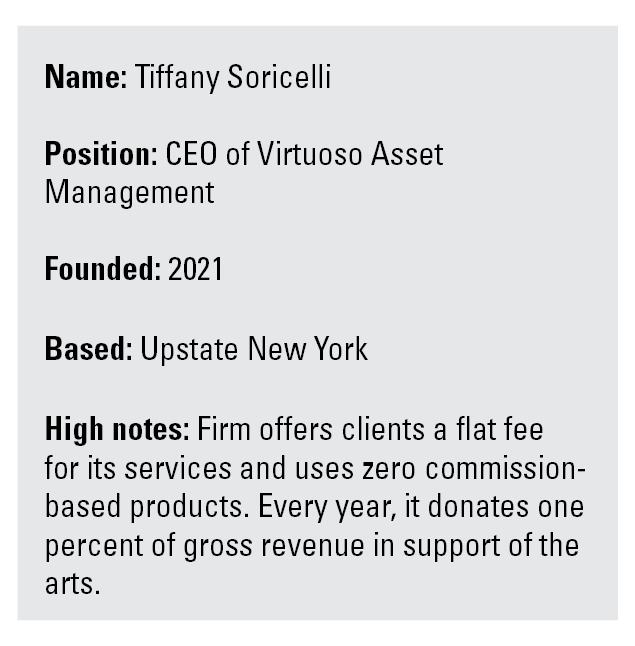

With an education in music and a background in the opera house, Tiffany Soricelli isn’t your average finance guru. However, the CEO of Virtuoso Asset Management reveals it was her unique career path and her commitment to creativity that ultimately led to her wealth management success.
“I have a bachelor's and a master’s in music – I’m an opera singer by training and performed professionally for 10 years before college,” Soricelli says. “When I got to school, I was very curious about the industry and the business side of it – so I took a job in arts management.”

And, despite her initial plan to pursue a full-time career in performing, Soricelli's practical side quickly took over.
“I realized that I was terrified to go full-time into performing because of the income inconsistency," she says. “There’s this societal expectation that if you're an artist then you must be poor – a ‘starving artist.’ Stability is important to me and for my family – being rooted and grounded was really [essential].”
Seeking stability, Soricelli, who lives in upstate New York outside of Saratoga Springs, found herself transitioning to work in a hedge fund as an assistant to the owner, supporting the fund-of-funds team-building investor materials, and preparing slide decks. She took to it like a fish to water.
“I loved it. It was my first foray into the financial sector; however, at the time, I had a lot of imposter syndrome. I ‘only’ had a Bachelor of Music, not even a Bachelor of Arts or Science. I worried no one else would hire me to work in finance.”
But as uneasy as Soricelli was, she was nothing if not determined – taking a less-traveled route into the industry.
“I left the hedge fund, earned my masters, and worked for nonprofits for about 10 years – running a professional orchestra, then serving as a director of development. I was helping to raise $3.3M a year and setting up sophisticated giving tools for a statewide nonprofit for parks in New York,” she says.
Eventually, Soricelli realized her true calling was in personal finance, particularly for those in the creative sector.
“My network was all artists and musicians, so when I transitioned to financial planning, I started to see the patterns and gaps in what they were taught about finances,” she says. “I make the joke that I can sing in four languages, but no one mentioned self-employment tax!”
Incorporating principles from behavioral finance is a cornerstone of Soricelli's approach – as is maintaining that creative mindset.
“I use principles of behavioral finance not just with the creatives, but with all clients. I do have some clients whom I affectionately term my ‘muggle’ clients, but when it comes to finances it’s important to understand how they think and feel about money and then to overcome those biases by addressing them head-on. When we’re talking about their goals or their cash flow, it’s through the lens of helping them understand their own emotional decision-making processes. I think a lot of creative professionals come to the subject matter feeling like [they’re] bad at money or there’s something wrong with them.”
Instead, Soricelli helps clients reframe this negative mindset – helping them understand that no one is really “taught” how to handle money and that they should give themselves a break.
“There’s that idea again that if you’re an artist, you must not be making any money,” she adds. “And if you want to make money, then clearly, you’re a sellout – which is not true! So when we're working on financial planning with artists, it’s really about helping them understand where they are and empowering them to take ownership of their earnings and spending behaviors, which then helps them on the path to achieving their goals. Cash flow management is key.”
As creatives, her clients face inconsistent income – one of their biggest challenges.
“Planning with unknown variables is really hard,” Soricelli acknowledges. To combat this, Soricelli helps her clients build systems to stabilize their cash flow, smoothing out the highs and lows of contract-based earnings.
"For those starting out, it’s about understanding the cash flow system they’re building toward while on their career path."
Financial literacy and education are also critical components of Soricelli’s work. Through her education company, Virtuoso Advising for Artists, she has connected with most top-level opera companies and classical arts organizations to teach financial literacy and business acumen to their young artists.
“The best coaches and stage time won’t help if people don’t have a basic understanding of business and finance," she says. “[Companies] noticed that this was a missing component in their young artists’ training and have hired me to help address it. When I teach, which is often in a group setting, I prefer to teach to the people in the room. Because finance is one of those things where, if someone just starts talking about compound interest and starts showing graphs and slides, the user tunes out and turns off. I want to know what’s on their hearts and minds and address those concerns in real time, so I teach to what’s important to them.”


Relationships are key to our business but advisors are often slow to engage in specific activities designed to foster them.

Whichever path you go down, act now while you're still in control.

Pro-bitcoin professionals, however, say the cryptocurrency has ushered in change.

“LPL has evolved significantly over the last decade and still wants to scale up,” says one industry executive.

Survey findings from the Nationwide Retirement Institute offers pearls of planning wisdom from 60- to 65-year-olds, as well as insights into concerns.
Streamline your outreach with Aidentified's AI-driven solutions
This season’s market volatility: Positioning for rate relief, income growth and the AI rebound
